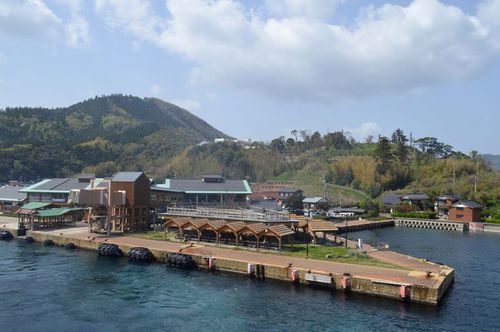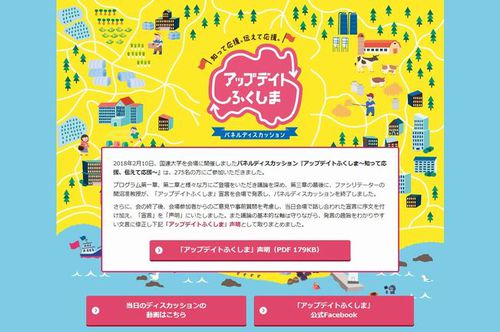JFS Newsletter No.190 (June 2018)

Image by Asturio Cantabrio Some Rights Reserved.
Junko Edahiro, chief executive of Japan for Sustainability, delivered a presentation at a parallel session on June 14, 2018, at the 16th Annual Meeting of International Society for Quality-of-Life Studies, held in Hong Kong. This month's JFS newsletter will introduce her presentation, titled "'Nai-Mono-Wa-Nai': Ama Town's Concept of Sufficiency and Message to the World."
Thoughts on Fukushima Today - "Update Fukushima"
The Executive Committee of "Update Fukushima" on February 10, 2018, cohosted a panel discussion with the Ministry of the Environment and United Nations University (UNU), titled, "Support Fukushima by Learning and Sharing with Others." The event, held at UNU, consisted of three parts: theories, case studies, and a summary. This article will cover part one, "Thoughts on Fukushima Today - Theories," to explain the current situation in Fukushima.
Recognizing that accurate information on the current state of Fukushima is not reaching people in Japan and abroad, "Update Fukushima" was held to clarify and share facts, viewpoints, and methods to correct misinformation and misunderstandings.
In part one, "Thoughts on Fukushima Today --Theories," four members of the Update Fukushima Executive Committee--Ryugo Hayano, Professor Emeritus, University of Tokyo; Sae Ochi, Lecturer, Department of Clinical Laboratory Medicine, Tokyo Jikei University School of Medicine; William McMichael, Assistant Professor, Faculty of Economics and Business Administration, Fukushima University; and Hiroshi Kainuma, Associate Professor, Kinugasa Research Organization, Ritsumeikan University--appeared on stage for a panel discussion on the current state of Fukushima and what can be done to accurately communicate information on Fukushima's agricultural produce, foods, environment, health, and the Fukushima Daiichi Nuclear Power Station.
For agricultural produce and foods, case studies on rice and other topics were presented. All rice produced in Fukushima has been thoroughly tested for radiation levels since the Great East Japan Earthquake and has never exceeded the regulatory limit since 2014. Nevertheless, there is a considerable number of people who refuse to eat it, or do eat it but hesitate to recommend it to others. The challenge is how to approach a situation where data alone is not enough to convince people.
Information on the natural environment, on outdoor radiation levels, for example, can be found by looking at publicly available data. Yet, despite actual radiation levels being within the acceptable range, impacts on health effects are beginning to emerge. For instance, children, fearing radiation, have stopped playing outside, which can lead to higher rates of obesity.
The recovery process at the Fukushima Daiichi Nuclear Power Plant has shifted from capping contaminated water and covering high-radiation areas of the reactor, to removing fuel that has fallen in the spent fuel pools. The panel pointed out, however, that the general public tend simply to perceive the situation as dangerous, rather than to gain specific knowledge of the situation.
The first chapter of the event closed with three brief suggestions from the panel on how to fix misinformation and misunderstandings about Fukushima.
Communicate to the broader public as well as individuals
Until now, the Japanese government has taken specific measures to provide information to individuals seeking it, including introducing a consultation system. On the other hand, given that many people do not know the current situation, a shift needs to be made to also communicating to the broader public.Enjoy the unknowns
The panel observed that clearly identifying what we do not know opens us to the opportunities presented by Fukushima. These unknowns should be broadly communicated, and in a way that encourages people to find joy in the mystery.Relevance and accuracy
It is important to communicate information on the most relevant issues--on health damage and discharge of contaminated water from the nuclear power plant, for example--and to communicate it with accuracy.
Japan for Sustainability (JFS) is a non-profit communication platform to
disseminate environmental information from Japan to the world. We are
grateful that people in 191 countries have found an interest in our free
e-mail publications, and will continue to do our best to deliver useful
information to our readers all around the globe.
Please feel free to forward this message to your colleagues and friends
wherever the Internet can reach. If you know colleagues or friends there
with an interest in sustainability, please do forward them one of our
newsletters and invite them to try our service. To subscribe for JFS
Newsletters, visit www.japanfs.org/en/newsletter/subscribe.html

If you find our information and activities unique and valuable,
we appreciate your support!
http://www.japanfs.org/en/join/donation.html

Use this form http://www.japanfs.org/acmailer/unsubscribe.html to
remove your email address from our mailing list.

We welcome your comments. Please send them to: info@japanfs.org

Japan for Sustainability (JFS)
 |  |  |
Copyright (c) 2018, Japan for Sustainability. All Rights Reserved.


